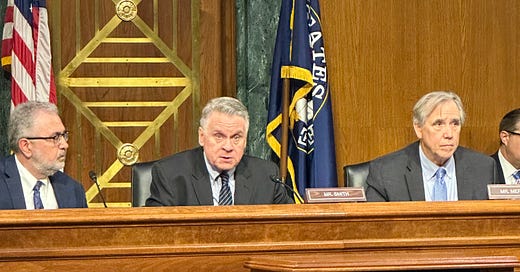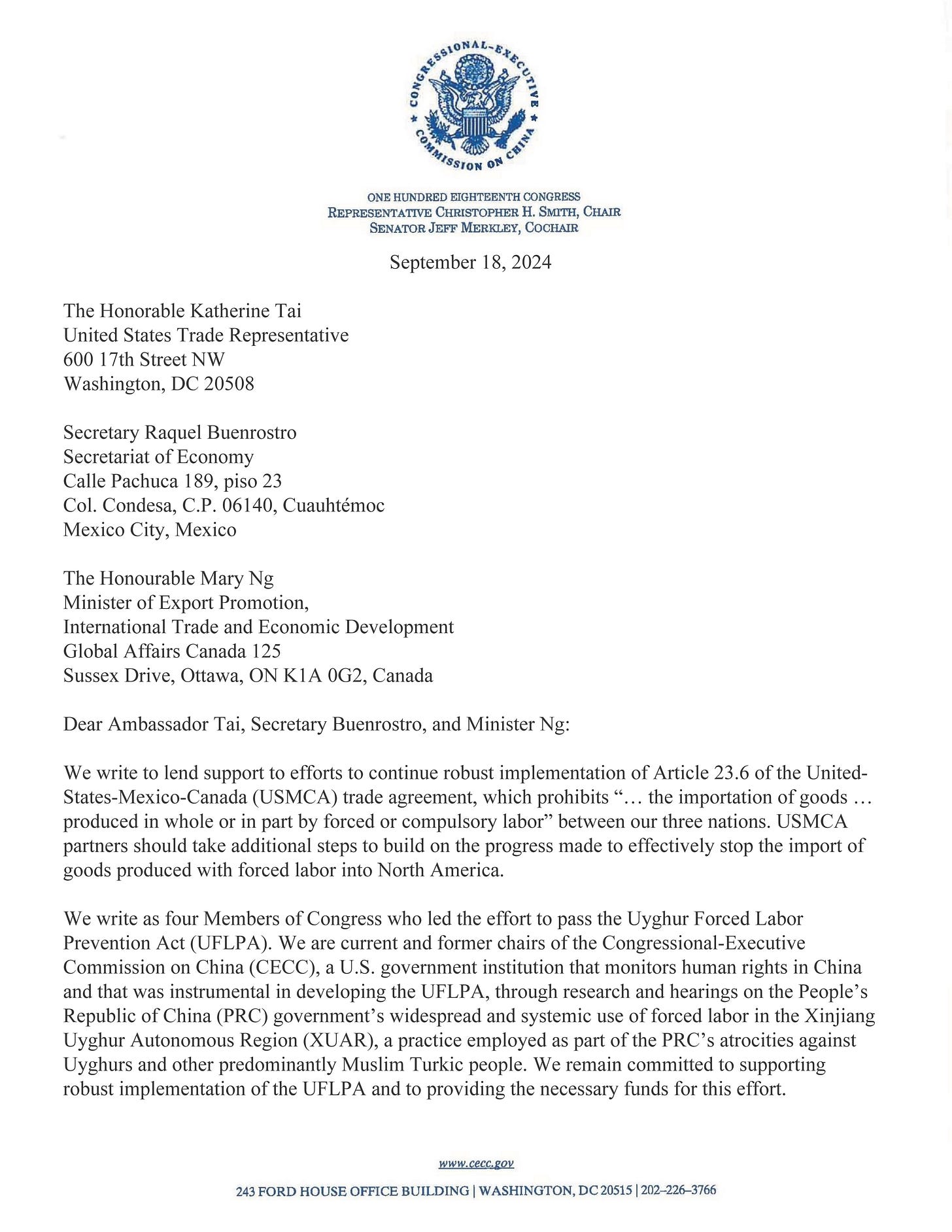A warning shot across the bow is a letter sent to all ministers responsible for trade in Canada, Mexico, and the United States. U.S. lawmakers, led by the current and past co-chairs of the Congressional-Executive Commission on China, are attempting to hold Mexico and Canada accountable for their lack of enforcement regarding provisions that require all countries to stop forced, slave, and child labour products from entering our supply chains.
Current Chair Congressman Chris Smith (New Jersey) and Democratic Senator Jeff Merkley (Oregon) strike a cordial tone of cooperation, but underlying this is a clear warning: America will not tolerate being undermined by its allies, who, to date, have not intercepted a single shipment of products from Xinjiang—where solar panels, cotton, tomatoes, and electronic components are produced using forced and child labour.
Above are Chair Congressman Chris Smith (Centre), Senator Jeff Merkley (right), and CECC Chief of Staff Piero Tozzi at last Wednesday’s hearing in Washington.
“We write to lend support to efforts to continue robust implementation of Article 23.6 of the United-States-Mexico-Canada (USMCA) trade agreement, which prohibits ‘… the importation of goods produced in whole or in part by forced or compulsory labor’ between our three nations.”
The letter, sent to Canada’s Minister of Export Promotion, International Trade and Economic Development, Mary Ng, raises important questions about the future of North American trade relations, especially regarding forced labour concerns linked to Xinjiang. It calls for enhanced cooperation under Article 23.6 of the USMCA to combat the importation of goods produced through forced labour.
The backdrop to this letter is the People’s Republic of China’s policies in Xinjiang, where Uyghur and other Turkic Muslim groups are subject to systemic repression, including forced labour. The U.S. passed the Uyghur Forced Labor Prevention Act (UFLPA) to prevent the importation of goods linked to forced labour from the region. The UFLPA operates under a “rebuttable presumption,” which places the burden on importers to prove that goods from Xinjiang, or those linked to state-imposed labour transfer programs, are free of forced labour. This assertive stance has positioned the U.S. as a global leader in preventing forced labour products from entering supply chains.
In Canada, the government had passed Bill S-211 in May of 2023. It was a private Members Bill originated by Liberal MP, John McKay and co-sponsored by Senator Julie Milville-Dechene. The measures introduced through Bill S-211, An Act to enact the Fighting Against Forced Labour and Child Labour in Supply Chains Act and to amend the Customs Tariff, aim to increase industry awareness and transparency, pushing businesses to improve their practices. There was pushback on the Bill’s implementation date as the government wanted to drag its heels for another year. But thanks to Minister Dominic Leblanc and MP Mckay, who pushed back against the resistance, the original implementation date of January 1, 2024, was met. It required a first filing by May 31, and it is believed that as many as 6,000 companies may have filed a report. Minister Ng is scheduled to table the report at the end of this month. However, compliance is voluntary, and while it increases all corporations' awareness, the result is that no shipments have been stopped.
Meanwhile, about a year ago, John McKay sat down with Senator Merkley in Washington and had a substantive discussion about his concern about Canada’s failure to intercept goods from dubious sources. This led to several media reports, and looking at this now, it’s not as though Canada was not forewarned that the US might take further action to push their partners to comply with the provisions within the USMCA. In March, Steven Chase and Robert Fife published an article titled “U.S. urges Canada to work together to curtail imports of forced-labour goods from China.” This was followed by CBC’s Washington correspondent Alex Panetta's report in June. He interviewed Senator Jeff Merkley, where it became clear the U.S. was frustrated with Canada’s lack of enforcement and hinted that further action might be on the horizon.
This letter suggests that the UFLPA’s model should be replicated across North America. It also raises concerns that some goods initially denied entry into the U.S. under the UFLPA have found their way into Canadian or Mexican markets, only to be re-exported to the U.S. One striking example involved solar panels denied entry into the U.S., later imported to Canada, with an attempt to re-export them back to the U.S. (referred to in the letter).
Implications for Canada and Mexico
It is clear that our U.S. neighbours are asking Canada to adopt more stringent forced labour regulations or simply start to enforce the provision within the USMCA. While Canada is strongly committed to human rights laws, the UFLPA’s stringent requirements set a high bar that would require substantial legislative and enforcement changes in Canada and Mexico. As Canada holds hearings on foreign interference this week, with the opposition demanding the release of the names of the 11 MPs and Senators under scrutiny, one hopes that none of the eleven under investigation are engaged in slow-rolling our commitment to adhere to our moral and legal obligations.
The Americans are pushing for the harmonization of forced labour policies across North America to prevent goods blocked in one country from easily entering another. This poses a challenge to Canadian lawmakers and our various agencies that are responsible for stopping forced labour products from entering the supply chain. But if we were to adopt laws and mechanisms similar to those of U.S. Customs and Border Protection (CBP), our Canadian Border Services Agency would have the tools to stop shipments tainted with forced or child labour.
There is Pressure on Canada
The communication should be seen as a clear signal of U.S. intent for Canada to comply with its obligations under the USMCA. The upcoming joint review of the USMCA in 2026 offers an opportunity for Canada and Mexico to align with U.S. priorities on forced labour. However, this may also ignite debates within Canada over whether such alignment is necessary or whether the U.S. is overstepping by exporting its enforcement model across North America. With China continuing its aggressive military build-up and claims over Taiwan, Canada may soon face a serious choice if it wishes to protect its economy.
The path forward likely involves closer coordination between allies and trade partners. However, whether Canada will embrace the UFLPA model or seek its own approach to meet its obligations under the USMCA remains to be seen.
More importantly, we owe the Uyghurs and other incarcerated people an obligation under the United Nations provisions for Human rights and to our own workers here in Canada some of whom lost good paying jobs to the PRC’s stealth and opaque labour practices. 2026 isn’t that far off, and no matter who wins the White House or forms government in Canada, let's work together to protect human rights worldwide and here in Canada.
Besides, not taking action and if the Americans are serious will imperil our future economic security.




